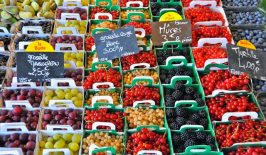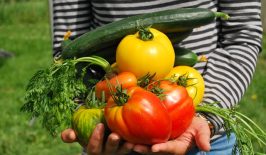Worried about where your vegetables come from? A Belgian supermarket has announced plans to grow and sell their very own vegetables in a rooftop garden starting next year. It follows an increasing trend towards urban farming, which aims for more sustainable, zero-mile food supplies for city dwellers.
The global rise in urbanisation has meant increased demands on the decreasing resources that are needed to feed rapidly growing urban populations. The United Nations Population Fund predicts that “by 2050 about 66 per cent of the world population will be living in cities”. Add in carbon-intensive transport practices, and it’s become clear that we need to come up with more sustainable food supply options, and quickly. But how does the current linchpin of urban food distribution- the supermarket – evolve to address rather than worsen the problem?
The Delhaize group has taken this question on board with plans to create the first self-producing store of its kind in the Brussels district of Ixelles. The retailer says that the project reflects their objectives of focusing on local and organic products, reducing CO2 emissions from transport, and encouraging greater involvement of the community and employees in sustainable commitments.
How Will It Work?
Beginning in summer 2017, the pilot program will be a test for potential gardens to be set up at other stores in the future. 320 square metres of rooftop space will be divided between open-air production and a greenhouse, so that short-cycle vegetables such as cherry tomatoes, salad and eggplants can be grown at anytime of year, as well as out-of-season. How much produce can be grown exactly is yet to be established, but the company says that the home-grown vegetables will cost less than organic ones sold in store. The real question will be what percentage of the store’s produce will come exclusively from the garden versus the amount still outsourced, and whether or not this will create a significant impact on the store’s overall food-supply sustainability goals.
Greater Outreach
The company also envisages getting the neighbourhood community involved with the garden, which will include working with and educating local school groups. As reported in the Brussels Times, the Belgian government has thrown its support behind the initiative as part of its “Good Food” plan to increase local, better quality, and more sustainable food production.
Urban Farming
Of course this is not the first supermarket of its kind to grow their own vegetables – a Berlin supermarket recently debuted Europe’s first in-store farming installation, and the Whole Foods chain in the US has been growing food on top of some of their stores for a number of years now.
However, the fact that a major European supermarket chain has embraced this project is another signal that urban agriculture as a sustainable option is becoming more of a reality for the average city dweller. While rooftop gardens will never be able to feed growing city populations entirely on their own, they certainly are a step towards re-thinking how and where city dwellers will get their food.






